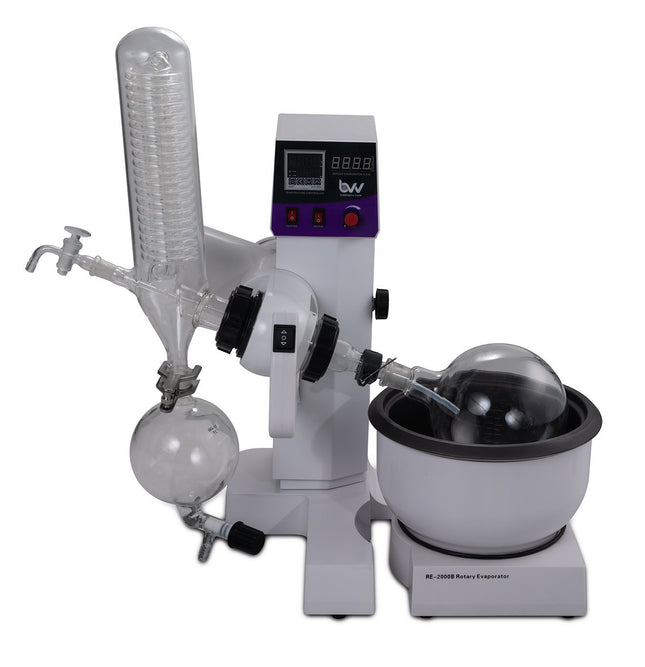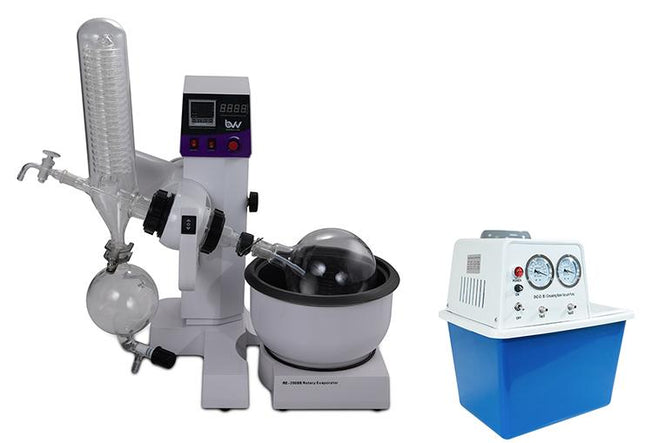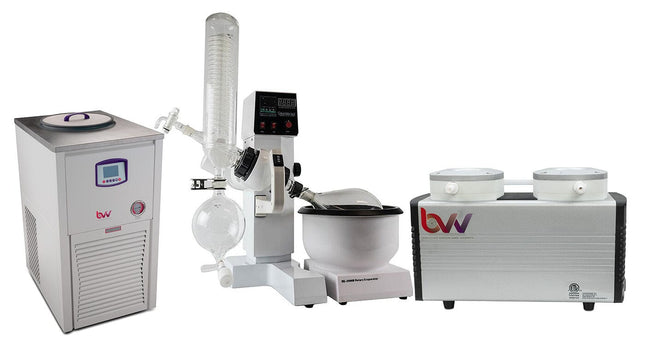Benchtop Solvent Recovery
-


Solvent Recovery Kit - 2 Gallon (Compares to ExtractCraft Source Turbo)
Solvent Recovery Kit - 2 Gallon The BVV Solvent Recovery Kit makes it easy for anyone to recover and reuse their extraction solvent. The kit uses a vacuum pump to lower the boiling point of the solvent, then will use a cooling source such as ice or dry ice to turn the vaporized solvent back into liquid form. This kit has a few different seals, be sure that all materials are compatible with your solvent. These materials include: Viton (FKM) Silicone EPDM / Butyl Please verify before using that all these materials are compatible with your solvent. For an easy resistance chart please visit the Cole Parmer link below: https://www.coleparmer.com/chemical-resistance What's included: No Pump BVV-2G Condensing Coil Hosing Glass Vacuum Chamber Lids/hardware Receiving Vessel Chamber Air Inlet Filter Evaporating Vessel Induction Heating Plate With Pump BVV-2G-V40 Condensing Coil Hosing Glass Vacuum Chamber Lids/hardware Receiving Vessel Chamber Air Inlet Filter Evaporating Vessel Induction Heating Plate Chemically Resistant Vacuum Pump No Evap/ Pump BVV-2G-NEV Condensing Coil Hosing Glass Vacuum Chamber Lids/hardware Receiving Vessel Chamber Air Inlet Filter Evaporating Vessel LID with Universal Gasket *NOTE: This option will fit any pot with an outer diameter of 6.5" - 10.5" Not included in the kit, you will need: Ice Tray Ice Bucket Ice or dry ice A 5 gallon bucket and disposable aluminum catering tray will suffice, however a container with a drain plug or valve would be ideal to easily drain the water produced throughout the process. This kit requires a vacuum pump to operate, we would recommend a chemically resistant diaphragm vacuum pump. We include a 1/4" JIC and 1/4" barb connection to connect to your vacuum pump. The included hosing is 1/4" ID Tygon tubing to easily attach to a barbed vacuum pump. Running the Unit Caution: Unit uses flammable solvents. Use caution while operating unit. ALWAYS OPERATE IN EXTREMELY WELL VENTILATED AREAS Place your solution into the Evaporating Vessel. This can be done by: removing the lid and pouring the solution into the vessel Using the vacuum pump to suck the liquid mixture through the Liquid Inlet Port. Using this method, you can use a Micro-Cap filter in-line to remove solid particulate. Close the Liquid Inlet Port valve and Air Inlet valve Add ice to the bucket and tray. A drain valve built in to the ice bucket and tray would help to drain water later in the test. Open the Vacuum Pump valve and turn on the Vacuum Pump Turn on the Heat Plate. An induction heating plate is recommended Replace ice as needed throughout the run When recovery is completed, close the Vacuum Pump valve and turn off the Vacuum Pump. Open the Air Inlet valve and release the vacuum pressure from the chamber. Use the included micron filter to prevent contaminants from entering the vessel. Turn off the Heat Plate and allow the solute in the Evaporating Vessel to come down to a safe temperature. Removing the solute is easiest when it is still warm. Remove the solvent from the Receiving Vessel. Once the kit is cooled down, use clean ethanol to wipe down the sealing surfaces for the next run. For a more detailed operating procedure please be sure to check out this website: HOME EXTRACTION BY ICHIBANCRAFTER : https://extractcrafter.com/2022/05/10/diy-vacuum-still-part-2-putting-together-and-operation/
$642.00 - $2,485.00
-

2L Electric Lift Rotary Evaporator
2L Electric Lift Rotary Evaporator The 2L BVV™ Electric Lift Rotary Evaporator is the ideal tabletop rotovap for small scale evaporation and recovery of solvents. Designed with ease of use in mind, the 2L allows users to separate solvents from a given mixture with minimal user input. The heating bath and temperature controls allow for precise, repeatable results. The double helix vertical condenser gives maximum surface area for condensation of vapors. PTFE seals on the entire system are made for maximum chemical resistance to ensure vacuum depth and lifespan of the system. Our rotovaps are a fraction of the price of more costly systems with the same functionaility and evaporation efficiency. 2L Best Value Electric Lift Rotovap Parts Diagram Features: Digital PID temperature and rotation speed control All PTFE valves for improved lifespan and chemical resistance Direct injection capability for continuous feeding of solution Small tabletop footprint Electric multi-level lifting mechanism for ease of use CE Listed 90-day limited warranty (excludes glassware, consumables & moving parts) Specifications: Model 2L Best Value Electric Lift Rotary Evaporator Optimum Ambient Temperature 5~25C / 41~105.8F Glass Material GG-17 High Borosilicate Power (V/Hz) 110V 60Hz Speed Regulation Digital Step-less Regulation Rotation Speed 20-198 RPM Set Temperature 0-99C / 0-210F Temperature Control Digital Temperature Control Maximum Vacuum Pressure -29.8 inHg Evaporating Flask Capacity 2L (2000mL) Receiving Flask Capacity 1L (1000mL) Condenser Style Vertical Double Helix Evaporation Capacity Alcohol >/= 1 L/H Heater Max Current Draw (Amps) 13.6 Water Bath Material Teflon Composite Water Bath Size 10 x 5 in. Lifting Function Electric Lifting Stroke 14cm / 5.5 in. Total Power Consumption (kW) 1.8 kW Dimensions 28 x 18 x 27 in. Weight 37.2 kg / 82 lbs Vacuum Connection 3/8” Barb Condenser Connection 3/8” Barb Warranty 90 days excluding glass parts Certifications CE Rotovap Quick Start Guide This guide gives basic quick start instructions for rotovaps. It is intended to provide a starting point for learning the process. Parameters should be adjusted to suit specific needs. Clean and assemble unit. Make sure all pieces are cleaned and sterilized using an alcohol solution. Connect chiller to condenser and set to 0C (32F). Always fill a rotovap condenser from the top down (chiller output to top of condenser, chiller input to bottom of condenser). Connect vacuum pump to cold trap and connect cold trap to vacuum port on rotovap. Turn on heat bath and set to 40C (113F). Once heat bath, chiller and cold trap have reached desired temperatures, turn on rotovap motor and set speed to approximately 100 RPM (does not have to be precise). Keep in mind, higher RPM’s will increase evaporation power but also increase heat load. Start vacuum pump and allow vacuum to pull down for a few minutes before injection. Once vacuum has been pulled to a sufficient level (does not have to be precise but should be below 100 Torr), using the injection valve, very slowly inject approximately 500 mL of solution into evaporating flask and then close the valve. Allow this small amount to begin evaporating. You may see the chiller begin to rise in temperature, this is called “priming” the rotovap. Once the temperature stops rising or all liquid is almost completely evaporated, open the injection valve again very slowly so that a small amount of liquid begins to enter the evaporating flask. Do not close injection valve this time but continue to allow solution to enter the evaporating flask. At this point you must try to match the input speed to the output speed. What this means is that you should be injecting the same amount of liquid into the rotovap that is equal to the amount of liquid dripping from the condenser into the receiving flask. You will know that the input speed and output speed are matched because the chiller will remain at a stable temperature. If the chiller begins to rise, then you are injecting too much liquid. Dial back the valve until the chiller stabilizes. Once everything is stabilized, you may walk away from the rotovap if necessary. Check every so often to make sure temperatures remain stable and evaporation continues efficiently. ***Note: All units are inspected for broken glass or parts before unit is shipped. If unit arrives damaged or glass is broken (this does not include minor imperfections or scuffs in glassware), Customer MUST contact BVV™ within 3 days of delivery to file a claim and receive a replacement part. If customer DOES NOT contact BVV™ within 3 days of delivery responsibility for replacement parts falls on the customer and they must pay for replacement pieces.*** ***Glassware Safety Disclaimer: BVV™ is not responsible for failure of glassware which must be inspected before and after every use because it may eventually develop imperfections or damage through normal usage, mishandling, and stress caused by temperature variations. If an imperfection or damage is noted while inspecting the glassware DO NOT use the glassware because it can fail causing bodily harm or damage to the surrounding area.***
$1,595.00 - $1,750.00
-

2L Electric Rotary Evaporator Kit with BVV Water Circulation Vacuum Pump
2L Electric Rotary Evaporator Kit with BVV™ Water Circulation Vacuum Pump 2L Electric Rotary Evaporator Kit with BVV™ Water Circulation Vacuum Pump setup includes all the neccessary components to successfully perform solvent recovery via rotary evaporation. A cold trap should always be used inline between your vacuum system and application to protect the pump from volatile vapors. 2L Rotary Evaporator Turnkey Setup includes: 2L Electric Lift Rotary Evaporator 90-day limited warranty (excludes glassware, consumables & moving parts) BVV™ Water Circulation Vacuum Pump Rotovap Quick Start Guide This guide gives basic quick start instructions for rotovaps. It is intended to provide a starting point for learning the process. Parameters should be adjusted to suit specific needs. Clean and assemble unit. Make sure all pieces are cleaned and sterilized using an alcohol solution. Connect chiller to the condenser and set to 0C (32F). Always fill a rotovap condenser from the top down (chiller output to top of the condenser, chiller input to bottom of the condenser). Connect vacuum pump to cold trap and connect cold trap to the vacuum port on rotovap. Turn on heat bath and set to 40C (113F). Once heat bath, chiller, and cold trap have reached desired temperatures, turn on the rotovap motor and set the speed to approximately 100 RPM (does not have to be precise). Keep in mind, higher RPM’s will increase evaporation power but also increase heat load. Start vacuum pump and allow vacuum to pull down for a few minutes before injection. Once the vacuum has been pulled to a sufficient level (does not have to be precise but should be below 100 Torr), using the injection valve, very slowly inject approximately 500 mL of solution into evaporating flask and then close the valve. Allow this small amount to begin evaporating. You may see the chiller begin to rise in temperature, this is called “priming” the rotovap. Once the temperature stops rising or all liquid is almost completely evaporated, open the injection valve again very slowly so that a small amount of liquid begins to enter the evaporating flask. Do not close injection valve this time but continue to allow the solution to enter the evaporating flask. At this point, you must try to match the input speed to the output speed. What this means is that you should be injecting the same amount of liquid into the rotovap that is equal to the amount of liquid dripping from the condenser into the receiving flask. You will know that the input speed and output speed are matched because the chiller will remain at a stable temperature. If the chiller begins to rise, then you are injecting too much liquid. Dial back the valve until the chiller stabilizes. Once everything is stabilized, you may walk away from the rotovap if necessary. Check every so often to make sure temperatures remain stable and evaporation continues efficiently. ***Glassware Safety Disclaimer: BVV™ is not responsible for failure of glassware which must be inspected before and after every use because it may eventually develop imperfections or damage through normal usage, mishandling, and stress caused by temperature variations. If an imperfection or damage is noted while inspecting the glassware DO NOT use the glassware because it can fail causing bodily harm or damage to the surrounding area.***
$1,850.00
-

2L Rotary Evaporator Turnkey Setup
2L Rotary Evaporator Turnkey Setup 2L Electric Lift Rotary Evaporator turnkey setup includes all the necessary components to successfully perform solvent recovery via rotary evaporation. A cold trap should always be used inline between your vacuum system and application to protect the pump from volatile vapors. 2L Rotary Evaporator Turnkey Setup includes: 2L Electric Lift Rotary Evaporator 90-day limited warranty (excludes glassware, consumables & moving parts) BVV NEO 1.4 CFM Diaphragm Pump ETL Rated OR. 3.5CFM Dry Floating Scroll Vacuum Pump Polyscience LS -20C to 40C 1/2HP Chiller w/ Turbine Pump OR BVV NEOCISION 20L Chiller (-40C) - ETL Rated 10ft of Vacuum Tubing 20ft of Chiller Tubing 10 Pack of Adjustable stainless steel hose clamps 3/8" Vacuum Manifold Optional add-on : BVV™ CT40 -40°F 300ml x 3 Cold Trap, BVV™ CT80 -112°F 300ml x 3 Cold Trap Optional add-on: J-KEM DVR-200 Digital Vacuum Regulator Optional add-on: Heat Transfer Fluid -- NuTherm PF-50 or Dynalene HC-50 Rotovap Quick Start Guide This guide gives basic quick start instructions for rotovaps. It is intended to provide a starting point for learning the process. Parameters should be adjusted to suit specific needs. Clean and assemble unit. Make sure all pieces are cleaned and sterilized using an alcohol solution. Connect chiller to the condenser and set to 0C (32F). Always fill a rotovap condenser from the top down (chiller output to top of the condenser, chiller input to bottom of the condenser). Connect vacuum pump to cold trap and connect cold trap to the vacuum port on rotovap. Turn on heat bath and set to 40C (113F). Once heat bath, chiller, and cold trap have reached desired temperatures, turn on the rotovap motor and set the speed to approximately 100 RPM (does not have to be precise). Keep in mind, higher RPM’s will increase evaporation power but also increase heat load. Start vacuum pump and allow vacuum to pull down for a few minutes before injection. Once the vacuum has been pulled to a sufficient level (does not have to be precise but should be below 100 Torr), using the injection valve, very slowly inject approximately 500 mL of solution into evaporating flask and then close the valve. Allow this small amount to begin evaporating. You may see the chiller begin to rise in temperature, this is called “priming” the rotovap. Once the temperature stops rising or all liquid is almost completely evaporated, open the injection valve again very slowly so that a small amount of liquid begins to enter the evaporating flask. Do not close injection valve this time but continue to allow the solution to enter the evaporating flask. At this point, you must try to match the input speed to the output speed. What this means is that you should be injecting the same amount of liquid into the rotovap that is equal to the amount of liquid dripping from the condenser into the receiving flask. You will know that the input speed and output speed are matched because the chiller will remain at a stable temperature. If the chiller begins to rise, then you are injecting too much liquid. Dial back the valve until the chiller stabilizes. Once everything is stabilized, you may walk away from the rotovap if necessary. Check every so often to make sure temperatures remain stable and evaporation continues efficiently. ***Glassware Safety Disclaimer: BVV™ is not responsible for failure of glassware which must be inspected before and after every use because it may eventually develop imperfections or damage through normal usage, mishandling, and stress caused by temperature variations. If an imperfection or damage is noted while inspecting the glassware DO NOT use the glassware because it can fail causing bodily harm or damage to the surrounding area.***
$13,500.00





